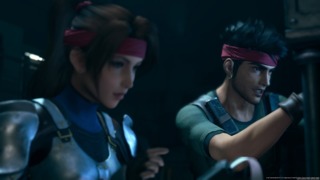Facing Destiny: On Final Fantasy VII Remake’s Ending
By majormitch 11 Comments
SPOILER WARNING: This blog assumes you are familiar with everything that happens in both Final Fantasy VII Remake as well as the original Final Fantasy VII. As such, there are massive spoilers below for both games (and this blog may not even make sense if you are not familiar with their plots anyway). Additionally, I give brief spoilers for the endings of the first Mass Effect, Star Wars: A New Hope, and The Lord of the Rings: The Fellowship of the Ring. Enter at your own risk :)
Final Fantasy VII Remake contains all of the hallmark moments of the opening hours of Final Fantasy VII. You go on the famous bombing mission to blow up Mako Reactor 1. You fall through the roof of the church and into Aerith’s flower bed in the sector 5 slums. You cross-dress to infiltrate Don Corneo’s hideout and interrogate him. You witness in horror as Shinra drops the sector 7 plate, mercilessly claiming countless innocent lives. You infiltrate the Shinra headquarters, save the girl, and make a daring escape from Midgar.
Yet as the credits roll, none of that seems to matter.

But let’s back up for a moment. When it was revealed that Final Fantasy VII Remake would only cover the Midgar portion of Final Fantasy VII, I was both skeptical and hopeful. On the one hand, it felt like a cheap ploy to needlessly extend a beloved classic into multiple, full priced parts, almost certainly by way of a lot of filler. On the other hand, if done well, it was a chance to flesh out the complicated world, characters, and story of Final Fantasy VII in fascinating ways; there was potential here to craft one of gaming’s grandest opuses. For most of Remake, we see both the bad and the good of this approach. There is indeed substantially more filler than I would like: Remake stretches a 5 hour portion of Final Fantasy VII across 40+ hours, thanks in large part to excessively lengthy and grindy dungeons, and rote side quests that have you perform the most banal of RPG jobs. But Remake also adds in welcome depth to the Final Fantasy VII lore in effective ways. I loved getting to know characters like Biggs, Wedge, and Jessie better, who were minor side characters in the original but get a lot of spotlight here. I loved the additional exploration of the way Shinra uses propaganda to influence its citizens, especially as it expands upon the war with Wutai that took place before the game. I loved getting to spend extra time with Aerith, and getting a much better study of her character; not to mention her new buddy routine with Tifa. I loved most of the new characters as well, and how much more we get to see what life in Midgar is like for the average person living there. It’s one of gaming’s most iconic cities, and that we get to see this city in ways that were only hinted at in the original is wonderful.
Most of all, I loved the way Remake positions the fight between AVALANCHE and Shinra as its core throughline plot. It not only makes sense as a plot with an extremely well-defined arc: you start out making inroads blowing up reactors, hit a strong moment of crisis when the plate is dropped, climax with the infiltration of the Shinra tower, and set up the next game with the dramatic revelations you have there. But it also serves as a great way to give the spotlight to one of Final Fantasy VII’s core themes that, in the original game, quickly becomes overshadowed by other concerns (ie: Sephiroth). Final Fantasy VII is, at its core, a game about saving the planet. For the first 5 hours of the original, you attempt to save the planet from an evil megacorporation that is literally bleeding the planet dry so that it can profit off of cheap energy, and you take the fight to them in their home base of Midgar. But once Sephiroth is introduced at the end of that opening act, Shinra takes a back seat while the main characters chase Sephiroth around the world. Remake, however, had the chance to dig deeper into Shinra and their evil ways. They are a huge threat to the planet -- certainly a big enough threat to pose as Remake’s primary antagonist -- and Barret and his team of AVALANCHE members serve as clear protagonists to root for in that fight, as they directly oppose everything Shinra stands for.

My favorite moments of Remake are the ones that dig deeper into that fight. We get more insight into Barret’s dedication to the cause, and just how extreme he is willing to be. We get more insight into Tifa’s concerns, and how she acts as a more moderate balance to Barret’s radical nature. I especially appreciate the dialogue between the two, as they both clearly share the same end goal (to stop Shinra), but differ on the best way to get there. Barret, the radical, wants to blow up Shinra at all costs, even if it means innocents die in the process. Tifa, the moderate, doubts if it’s worth sacrificing lives for change, and questions if there is a better way more than once. When those lives are inevitably lost, you can see their different philosophies come out in who they blame: Barret blames Shinra, Tifa blames herself and AVALANCHE. It’s a poignant and relevant moral dilemma worth discussing, and I’m happy to see Remake explore it further. Even past those two leads, we also get to see more about why their supporting characters are in this fight. In one of Remake’s best new chapters, we get Jessie’s backstory and learn why she fights. It turns out it’s not just the poor people of the slums that Shinra exploits, but also their own workers up top. These added stories and details are my favorite additions to Remake, and go a long way to flesh out the primary conflict of the Midgar portion of Final Fantasy VII, a portion that serves as the entirety of Remake's narrative arc.
That brings us to Remake’s ending, which has nothing to do with Shinra, AVALANCHE, Midgar, or really anything else that Remake focused on for the vast majority of its runtime. For its last few hours, Remake shatters the proverbial fourth wall to become a story about, well, changing the story of Final Fantasy VII. You learn that the whispers that hound you throughout the game exist solely to preserve the original Final Fantasy VII timeline, and Aerith opens a portal to another dimension where you fight the “boss” whisper, which Aerith more or less describes as Destiny itself. (Oh, and you fight Sephiroth there too, just ‘cause.) Now with this literal manifestation of destiny defeated, the characters of Final Fantasy VII are not bound to what happened in the original. We see that Biggs and Wedge survived the collapse of the sector 7 pillar after all, and we see that Zack may also live, a character who originally died before the start of Final Fantasy VII. This is a clear statement of intent from the developers of Remake: they can and will change things about Final Fantasy VII’s story going forward (not to mention that there’s a good chance multiple timelines are in play, and some characters like Aerith and Sephiroth clearly know more than they are letting on). Hell, even as you defeat the whispers, you see “flash forwards” of important events such as Aerith’s iconic death, and Red XIII running through the fields years after Meteor destroyed Midgar (the ending scene of the original game). The implication is that these events are no longer set in stone. The future is now open to any number of possibilities, and the game closes with that as a tease for ensuing installments of the Final Fantasy VII remake project.
Yet that tease for the future left me wanting for the present. Remake spent most of its time focused on the conflict between Shinra and AVALANCHE, and portrayed that conflict so well, and had me so invested, that its abrupt shift in focus was disheartening; when it never went back to give the Shinra-AVALANCHE story arc any kind of closure, I wondered what it was all for in the first place. When I think about my favorite first installments of larger franchises, I think of things like the original Mass Effect, Star Wars: A New Hope, or The Lord of the Rings: The Fellowship of the Ring. In each of those cases, they were part of a larger work that did not wrap up everything in a tidy bow; there was clearly more to do in their respective fights after their first parts. But they did provide satisfying closure for the smaller arcs contained within: Saren was defeated, the Death Star was destroyed, and the fellowship was dissolved in favor of Frodo travelling to Mordor with only Sam. Remake, however, does not. Instead, it breaks the fourth wall right at the end, which completely disrupts the story arc it had been expertly telling for dozens of hours. It’s a whiplash inducing shift, and I think this first part of the story suffers without some sense of closure to (or at least a smoother transition from) the Shinra-AVALANCHE arc that dominated so much of its runtime. The most frustrating part is that I think Remake could have had it both ways. I think it could have both provided a better closure to this arc of the Shinra-AVALANCHE conflict as the series transitions to Sephiroth, while also indicating that future parts will break further from the original Final Fantasy VII canon. Those are not mutually exclusive goals, and the fact that future parts will change aspects of the original is, to me, a very exciting idea. Teasing that is a great way to keep people like myself hooked for the future. But in its execution, I think Remake dropped the ball for the present. And that’s a real bummer.
Back in the Xbox 360 days, you could look at your friends list and not only see what game they were playing, but also a short status message about what they were actively doing in their game. Usually it was something generic like “Mission 2” or “Going on a raid” or “Team deathmatch on Strike.” But there was one game whose status message always made me chuckle: Final Fantasy XIII simply stated, at all times no matter where you were in the game, “Facing destiny.” My friends and I poked fun at how overly dramatic and silly it was, but Final Fantasy VII Remake takes the idea of facing destiny to another level. By making Destiny itself the final boss, Remake confronts and defeats its own 23 year old legacy, which sets up tantalizing possibilities for the future. I’m as excited as anyone to see where this journey goes, and when all is said and done this remake project could still be something special. But I can’t help but feel that in its execution, it came at the expense of telling a satisfying story arc for this first installment; my ultimate enjoyment of this first part will be retroactively dependent on what the subsequent parts hold. That it got so close, and told such a good story for so long, only makes that lack of closure even more frustrating. Final Fantasy VII Remake has prioritized confronting its own legacy over telling a complete story today, and until it delivers on its promises for the future, the events of the present ring hollow.
